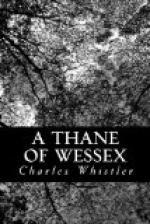Presently Wulfhere asked me if in that village we might find one good house where to lodge the Lady Alswythe. And I told him that there I had not been, but at least knew of one substantial franklin, for my playfellow, Turkil, had been the son of such an one, as I was told. The collier, who ran, holding my stirrup leather, tireless on his lean limbs as a deerhound, heard this, and told me that the man’s house was good and strong—not like those in Bridgwater—but a great house for these parts. So I was satisfied enough.
Then this man Dudda, finding I listened to him in that matter, began to talk, asking me questions of the fighting, and presently “if I had seen the saint?”
I asked him what he meant; and as I did so I heard Wulfhere chuckle to himself. Then he told me a wild story that was going round the town. How that, when all seemed lost, there came suddenly a wondrous vision, rising up before the men, of a saint clad in armour and riding a white horse, having his face covered lest men should be blinded by the light thereof, who, standing with drawn sword on Cannington Hill, so bade the men take courage that they turned and beat the Danes back. Whereupon he vanished, though the white horse yet remained for a little, before it, too, was gone.
Well, thought I, Grendel the fiend was I but the other day, and now I am to be a saint. And with that I could not restrain myself, but laughed as once before I had laughed at this same man, for the very foolishness of the thing. Yet I might not let Alswythe know that I laughed, and so could not let it go as I would, and I saw that Wulfhere was laughing likewise, silently.
Now this is not to be wondered at, though it was but a little thing maybe. For we had been like a long-bent bow, overstrained with doubt and anxiety, and, now that we were in safety with the lady, it needed but like this to slacken the tension, and bid our minds relieve themselves. So that laugh did us both good, and moreover took away some of the downcast look from our faces when next we spoke to our charge.
When he could speak again, Wulfhere answered the man, still smiling.
“Aye, man, I saw him. And he was wondrous like Heregar, our master, here.”
And at that the collier stared at me, and then said: “There be painted saints in our church. But they be not like mortal men, being no wise so well-favoured as the master.”
And that set Wulfhere laughing again, for the good monks who paint these things are seldom good limners, but make up for bad drawing by bright colour. So that one may only know saint from fiend by the gold, or the want of it, round his head.
Then fell I to thinking again about myself, and what it takes to make man a saint or a fiend. And that thought was a long thought.
Now were we come across Parret, and began our journey into the fens. And presently we must ride in single file along a narrow pathway which I could barely trace, and indeed in places could not make out at all. And here the collier led, going warily, then came Wulfhere, and then Alswythe, with myself next behind her to help if need were. After us the maidens, and then the rest.




